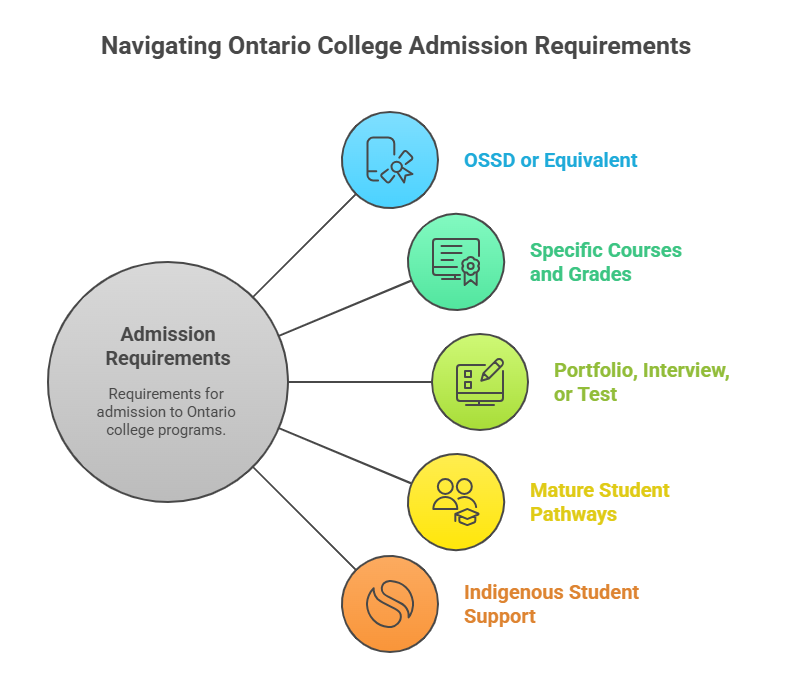Key Highlights of College Courses Ontario
- Ontario colleges give you many options for study. You can choose degree programs, diplomas, or certificates, so there is something for your career goals.
- There is a wide range of programs you can get into, like skilled trades, health sciences, or business administration, all popular with students.
- Many colleges let you pick a way of learning that works for you. You can take courses full-time, part-time, or go for online courses because they want to fit your schedule.
- The job market is strong for graduates. Almost 86% of students find a job in just six months after finishing.
- Ontario colleges offer financial aid options. This can be scholarships or help from the government, so you get money support for your education.
Introduction
Are you thinking about college courses in Ontario? You are making a good choice. Many people pick Ontario colleges because they focus on practical skills and give hands-on training. This helps you get ready for work. These colleges offer many degree programs, diplomas, and skilled trades courses. They are here to help you do well. Getting a college credential can give you the job-ready skills that employers want. It can also help you start a new career.
College Courses Ontario: Types, Formats, and Credentials
When you look at college courses in Ontario, you will find many options to fit your needs. The colleges have certificate programs, diploma programs, degree programs, and apprenticeship training. This gives you the chance to choose the path that works best for your timeline and goals.
Ontario colleges let you pick how you want to study. You can go for traditional classroom courses if that is what you want. There are full-time, part-time, and fully online courses too. This way, you can balance your school work with your other plans. Let’s see what makes these credentials and ways of learning different.
Certificates, Diplomas, and Degrees: Key Differences
Choosing between certificates, diplomas, and degrees depends on your career goals and time commitment. Certificate programs are the shortest, usually a year or less, and focus on specific job skills. Diplomas take two to three years, offering broader knowledge and practical training in a field. Degrees are four-year programs, providing in-depth theoretical and applied learning, similar to university but with more hands-on experience. Ontario colleges now offer bachelor’s degrees in areas such as business, nursing, and technology. Each credential prepares you for different job opportunities and advancement levels.
Here is a simple breakdown:
| Credential Type | Typical Duration | Focus |
|---|---|---|
| Certificate | One year or less | Specialized, job-specific skills |
| Diploma | Two to three years | Comprehensive knowledge and hands-on training |
| Degree | Four years | In-depth theory and applied learning |
Full-Time, Part-Time, and Online Learning Options
A major advantage of college courses Ontario offers is their flexibility. You can choose full-time, part-time, or online learning to fit your lifestyle and goals. Full-time study provides an immersive experience and lets you complete your program faster, making it ideal if you can focus mostly on your studies. Part-time college courses Ontario are perfect for those balancing work or family, as you take fewer courses each semester and progress at your own pace. Many colleges offer evening or weekend classes. Online courses are also popular, letting you study from anywhere with a flexible schedule.
- Full-time study: Immersive, faster completion.
- Part-time study: Flexible, ideal for balancing other commitments.
- Online courses: Complete your program remotely with a flexible schedule.
Popular Fields of Study in Ontario Programs
Ontario colleges offer programs that help you get jobs that are wanted right now. Many people choose fields based on what jobs need, so there is a big focus on practical skills. Health sciences, business administration, engineering technology, and skilled trades are at the top for students and companies. These are often the most popular.
If you want to study early childhood education or creative arts, there is a program to help get you ready for work. Over 80% of college graduates find a job in six months, so these programs match up well with what the job market asks for. Let’s look at the courses most people choose.
Business, Health Sciences, and Technology Courses
Many students in Ontario choose programs in business, health sciences, and technology. Colleges like Conestoga and Mohawk provide business administration courses covering topics such as accounting and supply chain management; co-op opportunities offer valuable real-world skills. Health sciences programs, available at colleges like Georgian and St. Clair, are in demand for careers in nursing, personal support, and dental hygiene, and feature hands-on training in modern labs. Technology programs at Algonquin and Seneca cover fields like computer science, engineering technology, and IT, preparing graduates for jobs in programming, engineering, or network administration.
- Business Management
- Practical Nursing (RPN)
- Computer Programming and Analysis
- Electrical Engineering Technician
Emerging Programs in Arts, Trades, and Social Services
Ontario colleges offer diverse emerging programs in arts, trades, and social services. In the arts, Sheridan College is world-renowned for its animation program, while Humber and George Brown excel in graphic design, fashion management, and interior design, attracting creative talent.
Skilled trades are vital to Ontario’s economy; colleges such as Conestoga provide training in carpentry, welding, and automotive repair, leading to rewarding careers. Community services remain important, with many students choosing early childhood education or social work. Colleges like Canadore also offer Indigenous studies, preparing graduates to serve diverse communities across the province.
- Animation and Game Design
- Carpentry and Renovation Techniques
- Early Childhood Education
- Community and Justice Services
How to Search and Apply for Ontario College Courses
Finding and signing up for Ontario college programs be a simple process. You can look for courses by field of study, credential type, or institution on each college’s website. These sites show full-time and part-time programs, so you can compare what’s offered. This helps you pick what’s right for your career goals.
After you choose your programs, you should check the admission requirements. These requirements are different for domestic and international students, and also change from one program to another. Knowing what the requirements are gives you a better chance to have a successful application.
Admission Requirements for Domestic Students

For domestic students, most Ontario college programs require an Ontario Secondary School Diploma (OSSD) or an equivalent. Some programs may need specific courses and minimum grades, especially in areas like health sciences or engineering technology. Creative arts programs might also require a portfolio, and competitive programs could ask for an interview or admissions test. It’s important to check each program’s requirements on the college website before applying. Mature students (usually 19 or older without an OSSD) can still apply, often based on work experience and an admissions test. Colleges also provide support and special pathways for Indigenous students.
- Ontario Secondary School Diploma (OSSD) or equivalent.
- Certain programs need special courses and grades.
- You may need a portfolio, interview, or admissions test for competitive programs.
- Colleges have different ways for mature students to get in.
Application Process for International Students
If you are an international student looking to enroll in college courses Ontario, you’ll need to follow some extra steps. You must meet academic requirements and prove English proficiency, usually through tests like IELTS or TOEFL, as each college sets its own minimum scores. Preparatory schools such as USCA Academy Ontario offer support to help you meet academic and English standards for Ontario colleges. Once accepted, you must apply for a Canadian study permit (student visa) by submitting documents that verify acceptance, financial ability, and identification.
- Proof of academic credentials (same as OSSD).
- English language ability test scores (like IELTS, TOEFL).
- A valid passport.
- Acceptance letter from the college with your study permit request.
Tuition Fees and Financial Aid for Ontario Programs
The cost of getting a college education is something you need to think about. Tuition costs in Ontario colleges depend on the school, the program, and if you are a domestic or international student. Certificate programs and diploma programs often cost less than four-year degree programs.
You do not need to pay for everything by yourself. There are good financial aid options to help you cover the costs. These include government loans, grants, scholarships, and bursaries. You can use these resources to help pay for your studies in Ontario colleges.
OSAP, Scholarships, and Other Aid Resources
The Ontario Student Assistance Program (OSAP) is the main financial aid source for students in Ontario, offering both grants (which don’t need to be repaid) and loans (which do), based on financial need. Colleges also provide scholarships for strong academics, community service, or sports, and bursaries for those with financial need. It’s important to research each college’s awards, as you may qualify for several. Many colleges have work-study programs, allowing students to earn money and gain experience through part-time campus jobs. These resources can help with tuition and other costs while supporting your educational journey.
- Ontario Student Assistance Program (OSAP) for loans and grants.
- College-specific scholarships for academic or personal achievement.
- Bursaries based on demonstrated financial need.
- On-campus work-study programs.
Conclusion
Looking into college courses in Ontario gives the students many options to get a good education. There is everything from certificates, diplomas, and degrees here. The programs cover lots of areas, and focus on the main fields like business, health sciences, and technology. You will need to learn about the admission requirements, the tuition fees, and what financial aid options you can get, such as OSAP. This matters for both domestic and international students.
With help from schools like USCA Academy, you can get support for every step along the way. Picking the right college course will change your future, so be sure to look at your options and make smart choices. If you want some personalized advice, our academic advisors can help you find your way.
Frequently Asked Questions
1. What is the difference between college and university programs in Ontario?
In Ontario, colleges give the kind of training where you do the work and learn by doing. This is for jobs that need your hands-on skills. They offer diplomas, certificates, and applied degree programs. On the other hand, universities, such as the University of Toronto, mostly teach about ideas and research. They give out undergraduate and graduate degrees. College graduates can get right to work as soon as they finish their studies.
2. Are Ontario college courses recognized internationally?
Yes, Ontario college certificates and diplomas are known and trusted around the world. Their programs in skilled trades, health sciences, and technology have high standards. Many employers look for people with this kind of training. Certificate programs and graduate certificate programs from Ontario colleges focus on real skills that get used on the job. That is why they are a good choice for international students who want to work in the global market.
3. Are there evening or weekend college courses available in Ontario?
Many Ontario colleges know that people have busy lives, so they offer part-time options. You, or anyone, can find programs with evening or weekend classes. There are now also more online courses, which let you learn when you want, in your own way.









